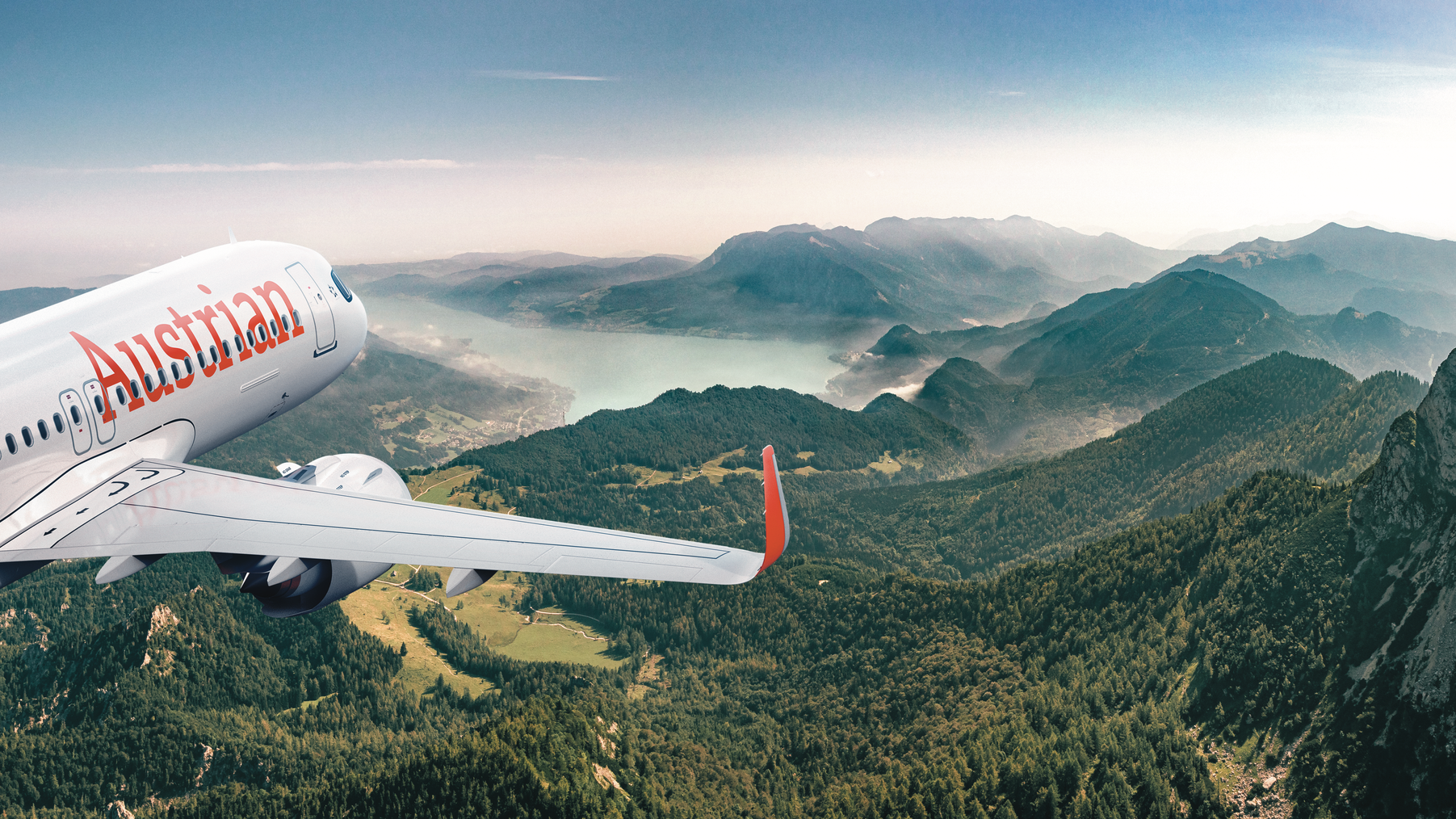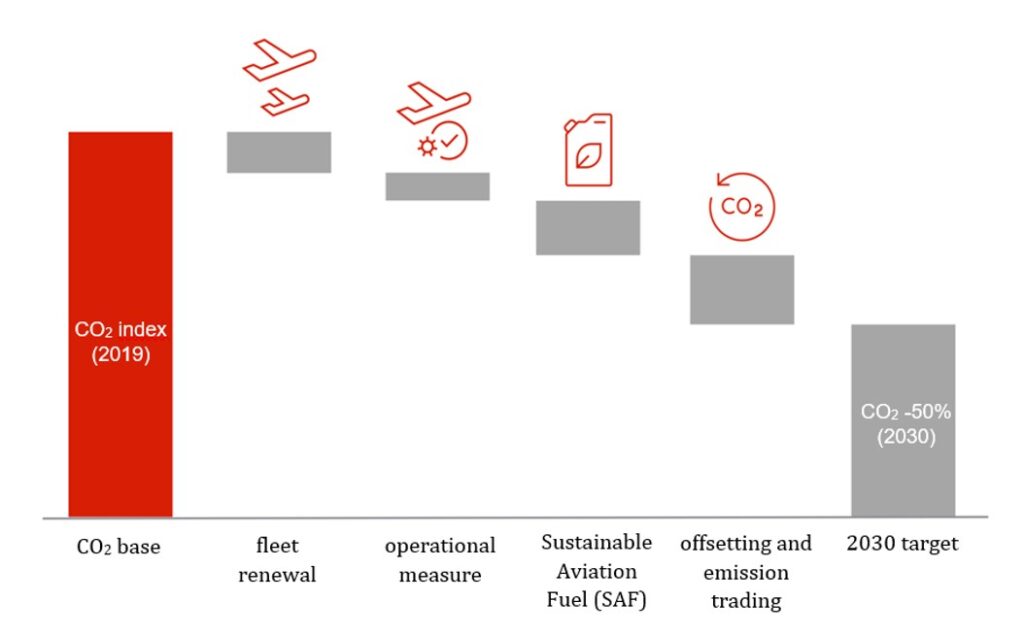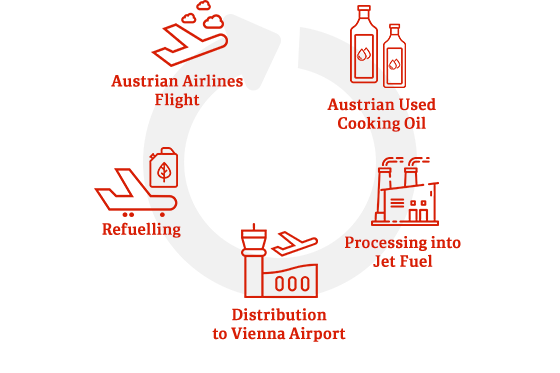Environmental Responsibility

Austrian Airlines is the largest airline in Austria with a global network of over 100 destinations. Aviation is a worldwide catalysator for growth, generates employments and encourage tourism. The aviation industry is of central importance for Austria as a location for business and industry. However, civil aviation is one of the most difficult sectors to decarbonise and has a major responsibility for climate change. Austrian is aware of this responsibility and has embarked on a journey towards a more sustainable future. Our integrated environmental strategy focuses on the reduction of CO2 emissions and the conservation of resources. As part of its strategy, Austrian Airlines has established ambitious CO2 reduction targets in collaboration with the Lufthansa Group.
As part of the Lufthansa Group, Austrian Airlines has set itself ambitious targets and is aiming for a neutral carbon footprint by 2050. We are following a clearly defined path to halve net CO2 emissions by 2030 compared to 2019 through reduction and compensation measures. This was successfully validated by the Science Based Targets Initiative (SBTi) in August 2022. To reduce CO2 emissions, we are focusing in particular on accelerated fleet modernisation, continuous optimisation of flight operations and the use of Sustainable Aviation Fuels (SAF).
Austrian Airlines is aware that the overall impact of air transport on the climate is not limited to the effect of CO2 emissions. Together with the Lufthansa Group, Austrian Airlines is involved in research projects that specifically analyse the impact of so-called non CO2 emissions.
Decarbonising the aviation industry is a major challenge and will require the scale-up of many new technologies. In order to achieve its CO2 target by 2030, Austrian Airlines is focusing on fleet modernisation, continuous optimisation of flight operations, the use of Sustainable Aviation Fuels (SAF) and additional investments in climate protection projects.

Modern, more fuel-efficient aircraft and engine technologies are a key lever for reducing emissions from flight operations. Austrian Airlines is also committed to the continuous optimisation of flight operational decisions to ensure the most fuel-efficient operation possible in the air and on the ground.
Continuous fleet renewal
Austrian Airlines is continuously investing in the modernisation of its aircraft. Compared to their predecessors, the latest generation of aircraft consume up to 30% less fuel and emit correspondingly less CO2. An Airbus A320neo or a Boeing B789 emits up to 20% less CO2 than the respective predecessor models. In addition, an Airbus A320neo taking off emits around 50% less noise than comparable aircraft. Measures for the technical modification of the existing fleet with the aim of increasing economic and environmental efficiency are also continuously reviewed and, where necessary, implemented in cooperation with partners from research and industry. This includes, for example, optimising engines. After being taken out of service, Lufthansa Group aircraft are either sold or recycled.
Measures in flight operations
Austrian Airlines optimises its flight operations on a daily basis, relying primarily on ongoing training and digital decision support to save as much fuel as possible during flight operations. Routes and cruising altitudes are continuously optimised before and during flights using the latest operational and meteorological data. Dispatchers and pilots have the latest digital tools at their disposal. After each flight, detailed flight data is systematically analysed and used to further improve the system. In this way, the effect of operational measures such as shutting down the engines for taxiing can be analysed and quantified with precision.
Sustainable Aviation Fuels (SAF) is the generic term for all aviation fuels produced without the use of fossil fuels. There are different types of production processes for Sustainable Aviation Fuels and a variety of raw materials are available. Compared to fossil fuels, today’s SAF reduce CO2 emissions by 80%.
Impact of SAF
Despite promising technological developments in electric, hybrid and hydrogen aircraft projects, long-haul aircraft will continue to rely on liquid fuels in the long term. The use of Sustainable Aviation Fuels (SAF) is essential to make today’s fleets more sustainable. Switching from fossil fuel paraffin to SAF will enable near CO2 neutral aviation in the future. Sustainable fuels are still only available in small quantities and are up to five times more expensive than fossil paraffin. Austrian Airlines, in partnership with Lufthansa Group, is one of the largest users of SAF. Biomass-to-Liquid fuels are available today, while the industry’s focus in the future will be on Power and Sun-to-Liquid fuels.

Biomass-to-Liquid
Biogenic waste, such as used cooking oil or fats, is the main source of the current generation of SAF. When SAF is burned, only the same amount of CO2 is released as was previously removed from the atmosphere elsewhere, for example by plants. Only the transport and production of SAF currently generates CO2 emissions. Compared to fossil fuels, today’s SAF reduces CO2 emissions by 80%. The SAF used by Austrian Airlines and the Lufthansa Group is produced exclusively from biogenic waste, meets the highest sustainability standards (RSB EU RED II Fuel Certification) and is certified according to the ISCC or RSB standard. This ensures that production does not compete with food production.
Power-to-Liquid and Sun-to-Liquid
In the future, it will be possible to produce SAF using Power-to-Liquid and Sun-to-Liquid processes. As the energy required for the process (electricity or heat) is generated from the renewable sources and the carbon required is extracted from the atmosphere, a virtually closed CO2 cycle can be achieved, making it possible to produce fuels that are virtually CO2 neutral.
Investments in climate protection projects
Austrian Airlines and the Lufthansa Group are focusing on measures to reduce CO2 emissions to meet the ambitious targets set out in the Paris Agreement. However, aviation will have to rely to some extent on CO2 offsets in other sectors to achieve the net-zero targets for 2050. In order to offset CO2 emissions that cannot (yet) be reduced, Austrian Airlines has been cooperating for many years with Climate Austria, a joint initiative with the Ministry of Environment and Vienna Airport, to offer passengers the option of voluntary CO2 offsetting. The contributions are used to support high-quality, certified climate protection projects worldwide.
In 2023, the climate projects portfolio of the entire Lufthansa Group was expanded and now comprises 15 projects, including, most recently, technology-based projects for the long-term absorbing of CO2. In addition to Climate Austria, the providers are myclimate, SQUAKE and ClimatePartner. All projects in the Lufthansa Group climate project portfolio are certified according to the highest available standards.
In cooperation with ÖBB, the first connection between Vienna Airport and Linz was launched in December 2014 with the initiative “AIRail” . The cooperation was extended to the Vienna Airport-Salzburg route in 2017 and the 100,000th visitor was welcomed on this route in 2019. The two connections to Linz and Salzburg have now been fully transferred to rail. In 2021, the route between Vienna Airport and Graz was added to the train-to-plane programme. This cooperation creates an alternative to travelling by air for passengers travelling to Vienna Airport. AIRail currently offers half-hourly connections between Vienna Airport and the city centres of Linz and Salzburg and ten daily connections between Vienna Airport and Graz.
Austrian Airlines has established an environmental management system with annual validation in accordance with the EMAS (Eco-Management and Audit Scheme) standard in order to make environmental efforts within the company traceable and measurable. The first validation was carried out in 2023.
EMAS is a voluntary instrument of the European Union that helps companies and organisations of all sizes and from all sectors to continuously improve their environmental performance. EMAS registration includes all the requirements of the international environmental management standard ISO 14001, supplemented by additional requirements. In its latest Environmental Statement, Austrian Airlines reports on its environmental performance in the reporting year 2023.
In the EU Emissions Trading System (EU ETS), CO2 emissions from air transportation have been controlled and limited by certificate trading since 2012. Austrian Airlines is subject to this system for all flights within the European Economic Area (EEA). Additional obligations to surrender emissions certificates arise from the emissions trading systems of Switzerland (CH-ETS, since January 2020) and the United Kingdom (UK-ETS, since January 2021) for flights between Austria and Switzerland and the United Kingdom.
With the agreement on climate protection reached at the International Civil Aviation Organisation (ICAO) in October 2016 – the Carbon Offsetting and Reduction Scheme for International Aviation (CORSIA) – growth-related CO2 emissions in international aviation have been offset by the purchase of certificates since 2021.
With the EU’s ReFuelEU regulation, all flights departing from the EU will be subject to a mandatory blending of Sustainable Aviation Fuels (SAF) from 2025.
Our offer for more sustainable air travel
With Green Fares, the Lufthansa Group airlines have been the first airline group worldwide to offer their own fare model for more sustainable flying since 2023. Green Fares enable more sustainable flying with just one click as a fare option with included offsetting of flight-related CO2 emissions. This is offset 20% through SAF use and 80% through a contribution to climate protection projects.
Austrian Airlines has been offering private and corporate travellers the option of making a voluntary contribution to more sustainable travel for several years now. Since 2022, passengers can choose to offset the CO2 emissions of their individual flight by purchasing sustainable fuel (SAF), supporting climate projects or a mix of both options at the end of the ticket purchase process when booking online with Austrian.
To reduce their Scope 3 emissions, companies have various options for reducing the CO2 emissions of their air travel with Lufthansa Group airlines. In addition to customised packages for the use of sustainable fuel (SAF), points can be exchanged for SAF as part of the Partner Plus Benefit Programme or CO2 emissions can be offset and reduced with a mix of SAF and climate protection projects similar to the Green Fares.
Further topics
The economically and ecologically efficient use of energy and resources is of crucial importance in all business areas of Austrian Airlines. The company endeavours to identify sustainable potential for the careful use of electricity and water and to develop appropriate solutions. Equally important are the measures to reduce and recycle waste. In product development and service, Austrian Airlines consistently follows the principles of “reduce – reuse – recycle – replace”. For example, the culinary offering focuses on the consistent selection of food produced in a resource-conserving manner and environmentally friendly packaging materials. Thanks to options such as pre-ordering and saving leftover food on board, as well as demand-driven production of fresh products in the Austrian Lounges, less food goes to waste.
Since 2020, the Lufthansa Group in Austria has exclusively purchased green electricity. Another important starting point on the ground is to implement energy-saving and resource-conserving aspects in the planning, renovation, and construction of buildings.
Since 2005, Austrian Airlines has participated in the internationally renowned mediation process (dialogue forum) at Vienna Airport and has actively worked with neighbouring communities and the Vienna Airport to find solutions that will sustainably reduce noise emissions. Significant contributions were made to the successful implementation of passive noise abatement measures in the airport region. More efficient approach routes, such as the curved approach, can reduce noise levels. Additionally, night flights regulations can help to minimise noise pollution during nighttime hours.
Austrian Airlines’ ongoing fleet renewal programme, in which older aircraft are being replaced by more efficient and quieter aircraft, is making a significant contribution to noise reduction. An Airbus A320neo is 50% quieter on take-off than an aircraft of the previous generation. The existing fleet is also being continuously optimised to reduce noise, such as the installation of vortex generators on all Airbus 320 and 321 aircraft, which significantly reduces noise on approach.